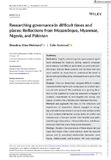| dc.contributor.author | Khan Mohmand, Shandana | |
| dc.contributor.author | Anderson, Colin | |
| dc.coverage.spatial | Mozambique | en |
| dc.coverage.spatial | Myanmar | en |
| dc.coverage.spatial | Nigeria | en |
| dc.coverage.spatial | Pakistan | en |
| dc.date.accessioned | 2022-09-29T09:45:57Z | |
| dc.date.available | 2022-09-29T09:45:57Z | |
| dc.date.issued | 2022-06-22 | |
| dc.identifier.citation | Khan Mohmand, S. and Anderson, C. (2022) 'Researching Governance in Difficult Times and Places: Reflections from Mozambique, Myanmar, Nigeria and Pakistan', Development Policy Review, 00, e12661, DOI: 10.1111/dpr.12661 | en |
| dc.identifier.uri | https://opendocs.ids.ac.uk/opendocs/handle/20.500.12413/17669 | |
| dc.description.abstract | Fragility and closing civic space present significant challenges for research, making research processes more onerous and difficult, particularly on social and political issues. And yet these contexts may be those that may most need to be researched to understand the trend in democratic backsliding being witnessed in many parts of the world.
How can researchers navigate difficult contexts characterized by fragility and closing space to conduct rigorous yet safe research? We contribute to a growing literature on this question by exploring researcher strategies in contexts characterized by both fragility and closing civic spaces, as well as the obstacles and challenges they face.
We draw on the reflections and experiences of researchers directly engaged in managing and undertaking research on social and political action in four contexts affected by varying levels of conflict and violence over a five-year period. Their insights were gathered through observations, informal interviews and discussions over that time, and a focus group discussion.
Based on the experiences of these researchers we argue that fragile citizen–state relations make the research process and its associated relationships themselves more fragile, indeterminate, and tentative. We note challenges of access, both formal and informal, low trust, and ethical dilemmas. We then highlight four strategies that stand out as common in navigating these challenges and undertaking research successfully.
We argue that research in fragile contexts with closing civic spaces needs long term collaboration with local partners that includes building capacity of emerging researchers and close accompaniment to create relationships of equality and a community of practice. This requires such research to be more and not less involved and engaged with participants and research partners located in these contexts, in contrast to suggestions elsewhere that more remote or virtual engagement is the answer. But this research needs to take account upfront of the inherent challenges and uncertainty of research process, and where findings can be safely shared. | en |
| dc.language.iso | en | en |
| dc.publisher | John Wiley & Sons, Ltd. | en |
| dc.rights.uri | http://creativecommons.org/licenses/by/4.0/ | en |
| dc.subject | Governance | en |
| dc.subject | Security and Conflict | en |
| dc.title | Researching Governance in Difficult Times and Places: Reflections from Mozambique, Myanmar, Nigeria and Pakistan | en |
| dc.type | Article | en |
| dc.rights.holder | © 2022 The Authors. Development Policy Review published by John Wiley & Sons Ltd on behalf of ODI | en |
| dc.identifier.externaluri | https://onlinelibrary.wiley.com/doi/abs/10.1111/dpr.12661 | en |
| dc.identifier.team | Power and Popular Politics | en |
| dc.identifier.doi | 10.1111/dpr.12661 | |
| dcterms.dateAccepted | 2022-06-22 | |
| rioxxterms.funder | Department for International Development | en |
| rioxxterms.identifier.project | PO7239 Action for Empowerment and Accountability Programme | en |
| rioxxterms.version | AM | en |
| rioxxterms.versionofrecord | 10.1111/dpr.12661 | en |
| rioxxterms.funder.project | 01e10511-513a-43f3-ad45-97d8cb13bae0 | en |


